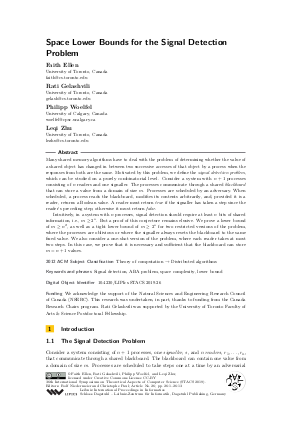Space Lower Bounds for the Signal Detection Problem
Authors Faith Ellen, Rati Gelashvili, Philipp Woelfel, Leqi Zhu
-
Part of:
Volume:
36th International Symposium on Theoretical Aspects of Computer Science (STACS 2019)
Part of: Series: Leibniz International Proceedings in Informatics (LIPIcs)
Part of: Conference: Symposium on Theoretical Aspects of Computer Science (STACS) - License:
 Creative Commons Attribution 3.0 Unported license
Creative Commons Attribution 3.0 Unported license
- Publication Date: 2019-03-12
File

PDF
LIPIcs.STACS.2019.26.pdf
- Filesize: 483 kB
- 13 pages
Document Identifiers
Subject Classification
ACM Subject Classification
- Theory of computation → Distributed algorithms
Keywords
- Signal detection
- ABA problem
- space complexity
- lower bound
Metrics
- Access Statistics
-
Total Accesses (updated on a weekly basis)
0PDF Downloads0Metadata Views
Abstract
Many shared memory algorithms have to deal with the problem of determining whether the value of a shared object has changed in between two successive accesses of that object by a process when the responses from both are the same. Motivated by this problem, we define the signal detection problem, which can be studied on a purely combinatorial level. Consider a system with n+1 processes consisting of n readers and one signaller. The processes communicate through a shared blackboard that can store a value from a domain of size m. Processes are scheduled by an adversary. When scheduled, a process reads the blackboard, modifies its contents arbitrarily, and, provided it is a reader, returns a Boolean value. A reader must return true if the signaller has taken a step since the reader’s preceding step; otherwise it must return false. Intuitively, in a system with n processes, signal detection should require at least n bits of shared information, i.e., m >= 2^n. But a proof of this conjecture remains elusive. We prove a lower bound of m >= n^2, as well as a tight lower bound of m >= 2^n for two restricted versions of the problem, where the processes are oblivious or where the signaller always resets the blackboard to the same fixed value. We also consider a one-shot version of the problem, where each reader takes at most two steps. In this case, we prove that it is necessary and sufficient that the blackboard can store m=n+1 values.
Cite As Get BibTex
Faith Ellen, Rati Gelashvili, Philipp Woelfel, and Leqi Zhu. Space Lower Bounds for the Signal Detection Problem. In 36th International Symposium on Theoretical Aspects of Computer Science (STACS 2019). Leibniz International Proceedings in Informatics (LIPIcs), Volume 126, pp. 26:1-26:13, Schloss Dagstuhl – Leibniz-Zentrum für Informatik (2019)
https://doi.org/10.4230/LIPIcs.STACS.2019.26
BibTex
@InProceedings{ellen_et_al:LIPIcs.STACS.2019.26,
author = {Ellen, Faith and Gelashvili, Rati and Woelfel, Philipp and Zhu, Leqi},
title = {{Space Lower Bounds for the Signal Detection Problem}},
booktitle = {36th International Symposium on Theoretical Aspects of Computer Science (STACS 2019)},
pages = {26:1--26:13},
series = {Leibniz International Proceedings in Informatics (LIPIcs)},
ISBN = {978-3-95977-100-9},
ISSN = {1868-8969},
year = {2019},
volume = {126},
editor = {Niedermeier, Rolf and Paul, Christophe},
publisher = {Schloss Dagstuhl -- Leibniz-Zentrum f{\"u}r Informatik},
address = {Dagstuhl, Germany},
URL = {https://drops.dagstuhl.de/entities/document/10.4230/LIPIcs.STACS.2019.26},
URN = {urn:nbn:de:0030-drops-102654},
doi = {10.4230/LIPIcs.STACS.2019.26},
annote = {Keywords: Signal detection, ABA problem, space complexity, lower bound}
}
Author Details
Funding
We acknowledge the support of the Natural Sciences and Engineering Research Council of Canada (NSERC). This research was undertaken, in part, thanks to funding from the Canada Research Chairs program. Rati Gelashvili was supported by the University of Toronto Faculty of Arts & Science Postdoctoral Fellowship.
References
-
Yehuda Afek, Hagit Attiya, Danny Dolev, Eli Gafni, Michael Merritt, and Nir Shavit. Atomic Snapshots of Shared Memory. \JACM, 40(4):873-890, 1993.

-
Zahra Aghazadeh and Philipp Woelfel. On the time and space complexity of ABA prevention and detection. In \PODC34th, pages 193-202, 2015.

- Wojciech Golab. Recoverable Consensus in Shared Memory. arXiv preprint, 2018. URL: http://arxiv.org/abs/1804.10597.
- Wojciech Golab and Danny Hendler. Recoverable Mutual Exclusion in Sub-logarithmic Time. In \PODC36th, pages 211-220, 2017. URL: http://dx.doi.org/10.1145/3087801.3087819.
-
Wojciech Golab and Aditya Ramaraju. Recoverable mutual exclusion. In \PODC35th, pages 65-74, 2016.

-
IBM. IBM system/370 extended architecture, principles of operation, 1983. Publication No. SA22-7085.

-
Prasad Jayanti and Srdjan Petrovic. Efficient and practical constructions of LL/SC variables. In \PODC2nd, pages 285-294, 2003.

-
Maged Michael. ABA prevention using single-word instructions. Technical report, IBM T. J. Watson Research Center, 2004.

-
Maged Michael. Practical Lock-Free and Wait-Free LL/SC/VL Implementations Using 64-Bit CAS. In Rachid Guerraoui, editor, \DISC18th, pages 144-158, 2004.

-
Mark Moir. Practical Implementations of Non-Blocking Synchronization Primitives. In \PODC16th, pages 219-228, 1997.

